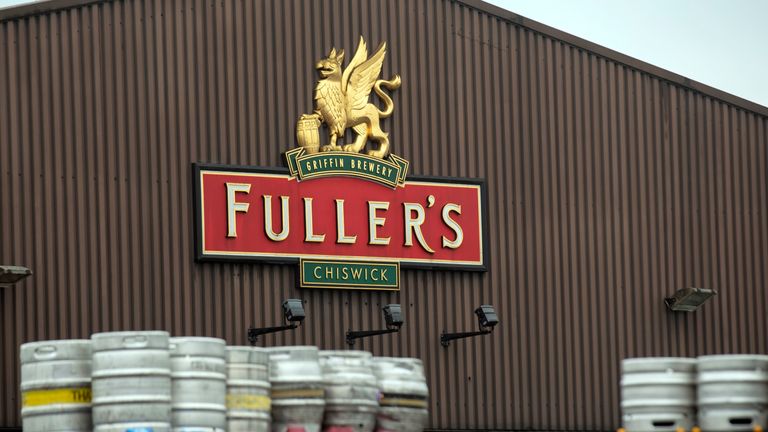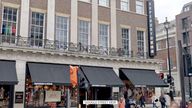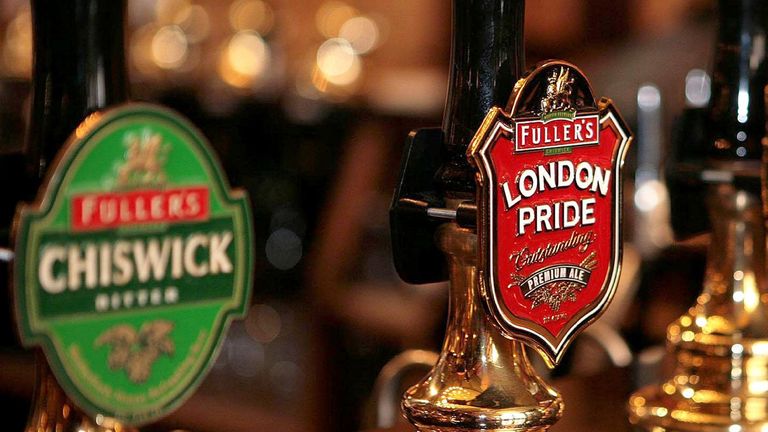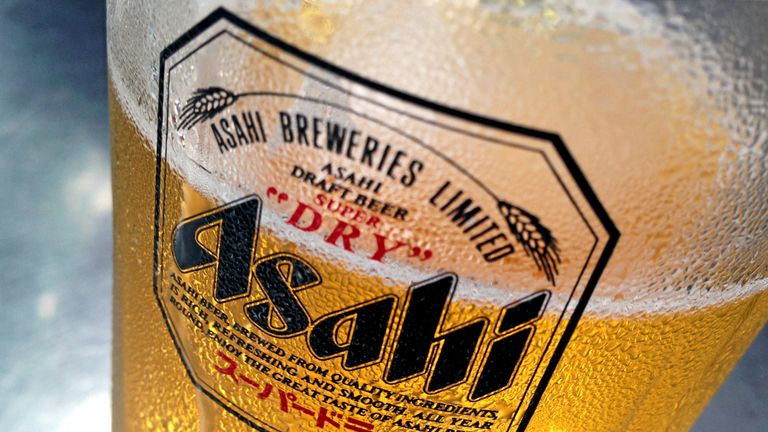Why did Fuller's sell its brewing arm to company known for bland beers?
Beer lovers are angry at the sale of the brewing business to a major international company best known for making bland lagers.
Friday 25 January 2019 15:47, UK
Fuller, Smith & Turner's decision to sell its brewing arm to Asahi of Japan has come as a shock to legions of beer lovers.
As Jackie Parker, the chairman of the Campaign for Real Ale, points out: "Fuller's has been a family brewer in Britain for more than 100 years, and it's a very sad day to see such a well-known, historic and respected name leaving the brewing business."
Roger Protz, author of the Good Beer Guide and one of the UK's foremost beer experts, declared himself to be "dumbfounded" by the deal.
And Dominic Walsh of The Times, Britain's foremost business journalist covering the leisure and hospitality sector, likened the £250m sale to the ravens leaving the Tower of London.
Those were the more polite comments.
Beer lovers take the ownership of who brews their favourite tipple exceptionally seriously and social media has been full of anger that Fuller's, still regarded by many as essentially a family company, has sold its brewing business to a major international company best known for making bland lagers.
The sale means Fuller's can no longer lay claim to owning London's last family brewery - a proud claim it has made since Young & Co sold its famous Ram brewery in Wandsworth, south London, in 2006.
:: Fuller's sells beer business to Asahi for £250m
Five years later, when Young's pulled out of brewing altogether, Fuller's published a statement saying: "We've been brewing for 350 years and we're going to continue for 350 more."
As it turns out, that pledge has lasted for barely eight years. Fuller's, like Young's, will now be a focused pub, restaurant and hotel operator.
So why is it selling? Firstly, because Asahi has made a fabulous offer.
It is paying getting on for twice what most City analysts had assumed the Fuller's brewing business was worth.
The price tag, more than 23 times the cashflow generated by the brewing business, is high by the standards of these deals.
Secondly, the brewing business had already become less important to Fuller's as a business.
Simon Emeny, the chief executive, pointed out that the group's managed pubs and hotels already contribute 87% of operating profits.
Those parts of the business were also growing more strongly than the brewing arm of the company.
Operating profits in the brewing arm went backwards in the last full financial year (2017-18) on which the company has reported, while in both 2016-17 and 2015-16, it suffered falling beer and cider volumes.
The company has clearly been finding the going tough and the chance to exit brewing at such a full price will have proved irresistible to the Fuller and Turner families who still own just over half the shares in the company.
Fuller's has also secured a promise from Asahi to continue brewing at the famous Griffin brewery in Chiswick, west London, although no such pledges appear to have been made about the Dark Star brewery in Sussex that Fuller's acquired only last year.
Nor does Asahi appear to have made any promises about the Gales and Seafarers brands that Fuller's acquired with its £92m takeover, 13 years ago, of the Hampshire brewer George Gale & Co.
The assumption will be that Asahi is really only interested in the blockbuster London Pride brand.
And it is quite a moment for brewing in the capital.
The city in which famous names such as Charrington, Watney, Whitbread, Courage and Truman were born now has no locally owned major brewers.
Even the sizeable players among the new wave of craft brewers to have emerged in the last decade or so have all fallen into foreign hands, with Camden Town brewery now owned by Budweiser-to-Stella Artois behemoth AB InBev, Beavertown owned by Heineken, the London Fields Brewery is owned by Carlsberg and the Meantime Brewery is now owned by Asahi itself.
That is not to say that brewing is in crisis in London or elsewhere.
Hundreds of craft brewers have emerged in recent years and the Morning Advertiser, the industry paper, reckons there are now more than 2,000 across the UK - the highest total since the 1930s - including dozens in the capital, including Whitechapel-based One Mile End, Hackney-based Five Points, Battersea-based Sambrook's, Bermondsey-based Kernel Brewery and Ealing-based Weird Beard.
But the sale by Fuller's does mark another nail in the coffin of the old "vertically integrated" arrangement in which brewers brewed beer and then sold it in pubs that they owned.
This was once the standard business model for the brewing sector until the 1989 Beer Orders broke the power of the "beerage" and resulted in most of the "big six" at that time - Bass, Courage, Scottish & Newcastle, Whitbread, Grand Metropolitan (owner of Watney, Mann & Truman) and Allied Breweries - eventually getting out of brewing altogether.
None of those companies still exists in the form they did 30 years ago. Whitbread still operates pubs but the bulk of its sales come from the Premier Inn budget hotel chain.
Bass became Intercontinental Hotel Group. Allied sold itself to Carlsberg. Grand Met and Courage both sold their brewing arms to Scottish & Newcastle, the last of the big six, which was bought by Carlsberg and Heineken in 2008.
Some smaller regional players, such as Yorkshire-based Samuel Smith's, Kent-based Shepherd Neame, Suffolk-based Adnams and Bristol-based Butcombe, are still set up in this way.
But the only genuinely major national players to still have a "vertically integrated" model of brewing and running pubs are Marston's and Greene King.
And, having seen the spike in Fuller's shares today, it would be remarkable if they were not giving some thought to offloading their brewing arms too.







